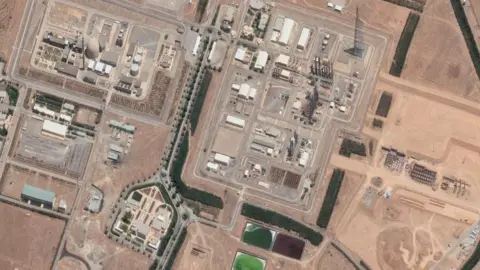Israeli hospital hit by Iranian missile strike
A hospital in the Israeli town of Beersheba has been hit as Iran fired a barrage of missiles at the country, with the conflict between the two nations continuing into a seventh day.
Iran said it had targeted a military site close to the hospital, not the facility itself. With strikes being reported in several locations across Israel, the country's health ministry said 271 people had been injured.
After visiting the Soroka Medical Centre on Thursday, Israel's Defence Minister Israel Katz said Iran's supreme leader "can no longer be allowed to exist".
Meanwhile, Israel's military said it had targeted Iran's nuclear sites including the "inactive" Arak heavy water reactor and Natanz facility.
The conflict began on 13 June, when Israel launched attacks on Iranian nuclear sites and killed several top generals and nuclear scientists.
Israel's deputy foreign affairs minister said Iran's hit on the Soroka hospital was "deliberate" and "criminal".
In a post on X, Sharren Haskel said the site that was the main medical centre for Israel's entire Negev region.
Israeli Prime Minister Benjamin Netanyahu said Israel would "exact the full price from the tyrants in Tehran".
While Israel's Defence Minister Israel Katz told reporters: "[Iran's Supreme Leader Ayatollah Ali] Khamenei openly declares that he wants Israel destroyed - he personally gives the order to fire on hospitals."
BBC correspondents in the area described the scale of the damage as extensive, with debris and plumes of smoke floating through the air long after the blast.
Several wards were completely destroyed as fire spread through one of the buildings, causing windows to smash and ceilings to collapse, hospital authorities said.
About 200 patients will be transferred to other hospitals centres, Prof Shlomi Codish, chief executive of the Soroka hospital said.
"At the moment we don't know if buildings or other wards might collapse," he added.
On Thursday morning, an Iranian ballistic missile struck the business district of Ramat Gan, east of Tel Aviv - causing a large sheet of glass to fall several floors from a skyscraper and part of an electrical pylon to crash to the ground.
About 20 people are believed to have been injured by the blast in the area, authorities have said.
Several senior Israeli officials, including the prime minister, visited the damaged hospital in Beersheba on Thursday.
Netanyahu told reporters at the site that Israeli forces had harmed "the nuclear program very strongly" but claimed that there are "other nuclear targets" and "nuclear missiles" in Iran.
"We will remove the nuclear threat, just as I promised. By the end of this operation, there will be no nuclear threat to Israel, nor will there be a ballistic missile threat."
In response to a question from News 12 about whether Khamenei is a target, PM Netanyahu replied: "I have instructed that no one is immune. I prefer not to deal with headlines and let actions speak."
The Israeli military said it told people living in the cities of Iranian cities Arak and Khondab, which are near the reactor, to leave the area "as soon as possible," in a post on X, prior to the attack.
The nuclear facilities that were attacked include a partially-built heavy-water research reactor.
Heavy-water reactors produce plutonium, which - like enriched uranium - can be used to make the core of an atom bomb.
Iranian media reported two projectiles hitting an area near the facility. There were no reports of radiation threats.
In a separate announcement, Israel's military said it also struck a site in the area of Natanz, which it said contains "unique components and equipment used to develop nuclear weapons".
Israel has alleged Iran has recently "taken steps to weaponise" its enriched uranium stockpile, which can be used for power plants or nuclear bombs. Iran has always claimed that its nuclear programme is entirely peaceful.
Iran's armed forces said their response to the Israeli attack will have "no limits."
It has lodged a complaint with the UN nuclear watchdog, accusing Israel of "continuing its aggression and actions contrary to international laws that prohibit attacks on nuclear facilities," Iranian state media reported.
 Reuters
ReutersThe UN's high commissioner Volker Türk said it was "appalling to see how civilians are treated as collateral damage" in the conflict.
He warned officials against "inflammatory rhetoric", which he said pointed to a "worrying intention to inflict harm on civilians.
"The only way out of this spiralling illogic of escalation is maximum restraint, full respect for international law, and return in good faith to the negotiating table."
On X, the International Committee of the Red Cross for Israel and occupied territories stressed that hospitals must be "respected and protected" under international law.
And the World Health Organization's director general said in a statement on X: "We call on all parties to protect health facilities, health personnel, and patients at all times."
The latest attacks come at a critical time, as President Trump considers the possibility of direct American involvement in Israel's campaign.
Iran's deputy foreign minister Kazem Gharibabadi warned the US that Tehran will have "no other option but to use its tools to teach aggressors a lesson" if it intervenes in support of Israel.
The Iranian Supreme Leader Ali Khamenei rejected Trump's calls to surrender, and Iran has threatened to strike American military interests in the Middle East in response.
Trump, so far, has given no clear indication of his next move. According to the BBC's partner CBS, he has approved plans to attack Iran but has held off on a final decision about striking the country.
On Wednesday, Trump said, "I may do it, I may not do it", when asked a question about US involvement in Iran.
Additional reporting by Tom Bennett in Jerusalem
